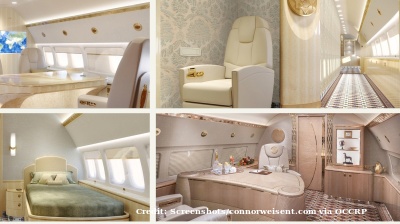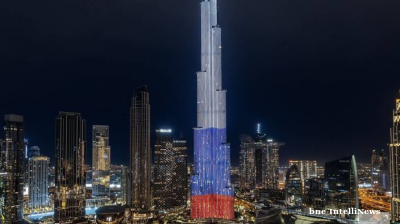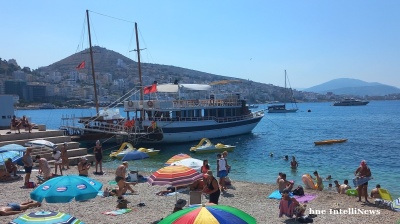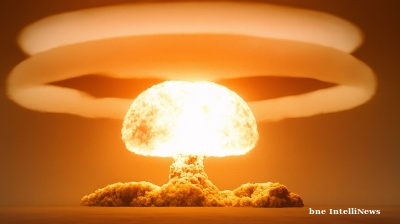The Moscow Consensus
Russia is our enemy. It is trying to destabilise the international order and undermine democracy so that Russian President Vladimir Putin can re-establish the USSR for the benefit of his corrupt cronies. Against him stand those of the civilised world who believe in the values of democratic individual freedoms, justice and the rule of law.
Is that a fairly accurate picture of how many governments and commentators see Russia today? I’m sure a lot of people would add a lot to the list, but let's take this as the starting point.
How about the Russians? They of course see things a little differently. The US is a global hegemon that is determined to dominate the international order with a unipolar view of the world. It is belligerent and adheres to international law only when it suits it. It invests in “human rights” and “pro-democracy” organisations as a proxy for importing its world view and imposing it on other countries. It's not Russia that is empire building, but the US through the relentless expansion of NATO to surround Russia, and the Americans would attempt regime change in Russia if they could.
You can take issue with all of this, and most of Russia’s claims – such as on NATO expansion – are simply dismissed in the West as excuses or whataboutism.
|
Washington Consensus |
Moscow Consensus |
|
Free trade |
Protectionism and autarky |
|
Private business independent of government, pursues only profit |
State-owned enterprises semi-commercial, participate in package deals including commerce, energy and arms deals |
|
Democracy with the individual vote sacrosanct |
Managed democracy with balance between individual votes and state interests |
|
Freedom of press, right to protest |
Managed press, restricted right to protest |
|
Unipolar world with US as global policeman |
Multi-polar world with UN and G20 taking collective decisions |
|
Putin is trying to destabilise the international order, undermine democracy and rebuild the USSR |
US is would-be global hegemon acting in its own interests first |
|
Low debt is good, but actually borrow heavily to support status quo |
Low debt is good and actually have low debt |
|
Corruption bad, but institutionalise legalised lobbying |
Corruption bad, but use corruption as a political tool |
Moscow Consensus
Where is the truth? Somewhere in the middle, but just how far to the right or left will remain the subject of a hot debate that will go on for as long as Putin remains in office.
While the international press is full of Russia-gate conspiracy theories and reports of very real Russia-linked assassinations that feed the fire, there is another pragmatic “Moscow Consensus” view of Russia that is a lot more benign.
This one is harder to sum up, but includes: yes, Russia is corrupt, but most Russians accept that as a fact of life as long as it stays “within reason”; yes, Russia is not very democratic, but people’s votes do matter, just not as much as they matter in the West; yes, there are big problems with the rule of law, property rights and corporate governance, but Russia has made enormous progress in the last three decades with all of these issues.
The list could go on, but the point is that the Western coverage of Russia compares Moscow today with London today, whereas the Moscow Consensus point of view highlights that Russia is a country that has been transitioning from being a totalitarian basket-case to a liberal free market capitalist system for only three decades. Compare Moscow in 1993 to Moscow in 2020 and they are night and day.
And the Moscow Consensus business people are putting their money where their mouth is. Bond investors are overweight with Russian Ministry of Finance ruble-denominated OFZ treasury bills, which are amongst the most popular bonds in the world. Equity investors were finally flooding back into Russian stock market in 2019, which was the best performing in the world. The RTS index broke its five-year highs in the first quarter of this year, until the emerging markets (EM) sell-off at the end of February marked the start of the current crisis. And ever since IKEA opened its first store in Russia in 2008, large multinational firms that are already in Russia continue to reinvest every kopeck they make into growth, as business is so profitable.
“Russia is a gold mine,” Vincent Gentil, the CEO of a leading French DIY chain, Leroy Merlin, told bne in 2016 in the midst of a recession at the time.
None of the members of the Moscow Consensus would suggest that Russia has fixed all of its problems, but their focus is on the dynamic and not the level the country is at. Thanks to extreme prudence in macroeconomic policy, the country has become more stable and the subsidy the government earns from raw material exports means money is continuously being invested into infrastructure, even if much of it is stolen.
Washington Consensus
The Moscow Consensus is a reaction to the Washington Consensus. British economist John Williamson coined the latter term in 1989, listing 10 principles that emerging markets should follow if they want to become successful countries.
It refers to a set of free-market economic policies supported by prominent financial institutions such as the International Monetary Fund, the World Bank and the US Treasury that has become the benchmark for orthodox values against which a country such as Russia is judged.
Essentially, the Washington Consensus advocates free trade, floating exchange rates, free markets and macroeconomic stability. The 10 principles originally stated by Williamson include 10 sets of relatively specific policy recommendations.
To this list we should add the more recent political points that are the basis of the conflict between Russia and the West and are fuelling a return to a Cold War split between East and West.
These are the 10 specific principles originally set out by Williamson 31 years ago:
1. Low government borrowing. The idea was to discourage developing economies from having high fiscal deficits relative to their GDP.
2. Diversion of public spending from subsidies to important long-term growth-supporting sectors such as primary education, primary healthcare and infrastructure.
3. Implementing tax reform policies to broaden the tax base and adopt moderate marginal tax rates.
4. Selecting interest rates that are determined by the market. These interest rates should be positive after taking inflation into account (real interest rate).
5. Encouraging competitive exchange rates through a freely floating currency exchange rate.
6. Adoption of free trade policies. This would result in the liberalisation of imports, removing trade barriers such as tariffs and quotas.
7. Relaxing rules on foreign direct investment (FDI).
8. The privatisation of state enterprises. Typically, in developing countries, these industries include the railways, oil and gas.
9. The eradication of regulations and policies that restrict competition or add unnecessary barriers to entry.
10. Development of property rights.
Add to this the political points:
1. Democracy is the best system with the individual vote as the fundamental unit of politics.
2. The “leading” nations are responsible for world order and police that order with international organisations such as the UN and NATO.
Russia objects to many of these points – especially the political ones – and it is increasingly being joined by other countries. An illiberal wave has swept through Central Europe that is increasingly closer to the Moscow Consensus than it is to the Washington version. And if anything, China’s version of values goes even further than the Moscow Consensus; at least Russia has adopted a managed democracy, whereas China rejects democracy as a political system completely.
Moscow vs Washington Consensus
If we compare the two systems, then it quickly becomes apparent that few Western countries actually stick religiously to the Washington Consensus principles. It also becomes clear that the Moscow Consensus has not grown out of an ideology, but is to a large extent a reaction to the Washington Consensus.
• Democracy
Democracy is not officially part of the Washington Consensus, but it stands at the heart of the idea, because a free market and a free people are intimately intertwined.
In 1991 Russia abandoned the totalitarian communist system and became a democracy. However, Russia’s version is a “managed” or “sovereign democracy” that was the brainchild of Putin’s advisor Vladislav Surkov, who coined the term in a speech in 2006.
According to Surkov, a sovereign democracy is: “A society's political life where the political powers, their authorities and decisions are decided and controlled by a diverse Russian nation for the purpose of reaching material welfare, freedom and fairness by all citizens, social groups and nationalities, by the people that formed it.”
In other words: people have a vote but that is balanced against the state, which remains in control for the benefit of the people. This idea was born out of the context of the chaotic '90s, when the state had basically collapsed. Political party politics meant nothing then. All that was important was who could bring stability and growth. But of course these ideas also have their root in Russia’s long tradition of autocratic Tsars (Autocrat was one of the Tsar’s official titles) which was taken over by the communists.
And the people were quiet happy with this deal until recently. It was the basis of the “social contract” between Putin and the voters, where they conceded political power in return for growing prosperity. This deal only started to break down after 2013, when economic stagnation set in and as the emerging middle class had reached a point where life was comfortable enough and they began to ask for a bigger role in running the country.
The West has its own problems with democracy. The sacrosanct principle of “one man, one vote” has also been badly mauled in the US by voter suppression via ID requirements as well as extreme gerrymandering that has cut districts up into impossible shapes, disenfranchising large numbers of voters. The situation has contributed to the Black Lives Matter protests, among other things.
• NATO expansion
Maybe the biggest bone of contention between Washington and Moscow is NATO expansion. Putin angrily claimed that the West promised Mikhail Gorbachev that NATO would not expand eastwards during his now famous Munich Security Conference speech in 2007.
NATO flatly denied any such promise had been made during the Ukraine crisis in 2014: “No such pledge was made, and no evidence to back up Russia’s claims has ever been produced.”
However, a team at George Washington University published declassified documents showing that a dozen top Western diplomats did in fact promise no expansion, starting with West German Foreign Minister Hans-Dietrich Genscher and including Chancellor Kohl, US Secretary of State James Baker and British Foreign Minister Douglas Hurd among others.
“All the Western foreign ministers were on board with Genscher, Kohl and James Baker,” the George Washington University team said in their paper.
But nothing was ever put on paper and in the world of diplomacy there is a big difference between a verbal promise and a treaty.
Putin intends to hold the West to the promise even if it was not written down – or at least prevent further NATO expansion. Russia rejects the unipolar view of the world, where the US is a global policeman. Putin has advocated a multi-polar world that acts in concert through bodies like the G20 or the UN.
• Corruption
While the Washington Consensus does not name corruption specifically, eradicating graft is implicit in all the points.
In the West, corruption is unacceptable and a large body of law and law enforcement is dedicated to preventing it. In the East, as bne IntelliNews has written elsewhere, corruption is the system.
The difference is that over the last few hundred years the West has built up institutions and a system of checks and balances that guard against corruption. Only 30 years into the game few of these institutions have been created in the East. Without them the most effective way for a political leader to bind his minions and control them is to grant them fiefdoms from which they can draw rents. Corruption is a means of control.
The exception is the 2003 EU accession countries that had EU institutions forced on them ready-made. And the result was an extraordinary boom in Central Europe. But here too these countries are now backtracking and Hungary and Poland, for example, are actively attempting to dismantle their institutions. On the flipside, the current crisis has forced some of the countries in the East to actively build up their institutions as a way of saving money: the Russian tax service is an outstanding example. It has been revolutionised in the last six years. Corruption is being tackled in the East, but out of pragmatic necessity, not because of principles.
The Moscow Consensus sees corruption as a fact of life; Russians expect their leaders to be corrupt. The issue is simply the level of corruption. There is a complex set of unwritten rules dealing with corruption and citizens are more tolerant of corruption than they are in the West.
Corruption is a big problem in the West too, but there the larger part is institutionalised. Lobbying is a multi-billion dollar business, where former politicians can be hired to push laws that benefit private interests legally. And the lack of controls over campaign financing in the US is another form of big business corruption that is worth multiple billions of dollars a year.
• Low government borrowing
The advice to keep debt low has bizarrely been turned on its head. Russia now has zero net public or external debt, having built up almost $580bn in reserves. In the West, governments across the developed markets have built up historical record amounts of debt. According to the Institute of International Finance (IIF), developed markets now have an average of 266% of GDP of debt, whereas emerging markets have 166%. According to the EU’s Maastricht treaty, debt was supposed to be capped at 60% of GDP.
Debt has been the bane of emerging markets. Africa in the '70s fell into debt traps as the cost of servicing debt ate up governments' revenue, forcing them to borrow more.
Putin embraced the idea of low debt almost as soon as he took over in 2000. The IMF borrowing was quickly paid off and then the London and Paris Clubs of debt were paid down. Since then, the Russian government has run deficit-free budgets for almost two decades and maintained public debt in the low teens, while concurrently building up hard currency reserves. This is just what the Washington Consensus calls for, yet Russia is now criticised for having too little debt.
“Putin continues to hoard international currency reserves, giving his view of 'sovereignty' priority over the standard of living of the Russian people,” tweeted Anders Aslund, a senior fellow at the Atlantic Council, after the Central Bank of Russia (CBR) announced reserves were up at $587bn at the start of August.
Low debt is a core part of the Moscow Consensus as the “financial fortress” makes a country impervious to sanctions. Both Russia and China have followed this model, made possible by their export of raw materials and cheap labour respectively.
• Free trade & protectionism
Free trade is a core value in the Washington Consensus, but some economists argue that throwing open markets at the early stage of transformation in emerging markets is actually a bad idea. The inefficient and low-quality domestic industries are simply crushed by the international competition, who produce better for less.
Russia actually embraced the idea of free trade and campaigned for over a decade to be allowed into the World Trade Organisation (WTO), only to be blocked by the US. It was finally admitted in August 2012.
However, only two years later Russia abandoned the WTO as the tit-for-tat sanctions over the annexation of Crimea effectively introduced austere protection regimes. Now Russia is pursuing a policy of autarky for national security reasons. China has always kept its market very closed and that has led to trade wars with America, as US President Donald Trump’s natural inclination is also towards protectionism.
Free trade under both the Washington and Moscow Consensuses has been increasingly distorted by commercial goals. Another key element of the Moscow Consensus has been to wrap trade deals with politically motivated arms and energy deals that bind client countries to Moscow. For example, Russia currently has 40 international nuclear power projects under way worth $137bn, in which Moscow has financed the deal. The US is increasingly adopting the same tactics, but by more aggressively using the sanctions regime to promote US commercial interests.
The sanctions proposed on Russia’s Nord Stream 2 gas pipeline between the Yamal gas fields in Russia and Germany, for example, are purportedly to save Europe’s “energy security” but Europe’s gas imports have already been well diversified. Europe’s dependence on Russian imported gas has fallen from 80% in the 1970s to about 30% now. The goal of the sanctions is clearly to block cheap Russian gas imports to Europe to boost US exports of LNG to the same market.
• Privatisation
The Washington Consensus takes as a priori that privately owned business are more efficient and profitable than state-owned companies. While the Moscow Consensus does not deny the efficiency argument, the state is not prepared to give up the political leverage that comes with a lot of big international business.
Free trade comes with free markets where the privately owned companies are king. But another key aspect of the Moscow Consensus is that publicly owned companies play the lead role if the state wants to offer its package deals. If anything, Chinese state-owned firms play an even more obvious role in trade/investment. They have been investing huge sums in developing economies in Africa, Asia, and Latin America under the Belt and Road programme, as well as making equity investments in the producers of raw materials that China is short of – which is pretty much everything.
And unlike the West, where individual companies offer individual deals, the Kremlin continues to offer its international partners a comprehensive package that bundles together arms, energy, trade and the financing for projects such as a brand new $10bn nuclear power station.
Like with free trade, Moscow initially bought into the idea of privately owned enterprise, but quickly abandoned it again as tensions with the West rose. In 2008, then Russian president Dmitry Medvedev attempted to restart privatisations with a comprehensive programme, announcing his intent with a speech at St Petersburg International Economic Forum (SPIEF). That year marked the high-water mark of Russia’s liberalisation and the closest it ever came to adopting the values of the Washington Consensus. But the crisis of the same year, caused by the US sub-prime mortgage debacle, saw the programme abandoned and the start of building up what is now the Moscow Consensus alternative, where the state retains control of the biggest companies for political as well as commercial purposes.
The one concession that the Kremlin has made to privatisation is that instead of setting up monopolies it has chosen duopolies instead: two big state-owned enterprises that directly compete with each other, such as Gazprom/Rosneft in the energy sector or Sberbank/VTB in the banking sector.
• Economic war
Why has the Kremlin abandoned the Washington Consensus? Part of the reason is Russia has found itself in an undeclared economic war with the US. The emphasis since 2012, when it began to modernise its military in earnest, has been on security not prosperity.
Most commentators point to the annexation of Crimea as the start of open hostilities, but the start of the conflict began earlier with the US unilaterally withdrawing from the Anti-Ballistic Missile Treaty (ABM) in 2001, a key part of Europe’s security infrastructure from the '70s, which the Brookings Institute called a “foreign policy disaster.”
That was followed by several disappointments on the business front. In the noughties Russia’s economy was booming and the Kremlin was looking for ways to modernise the economy quickly. With money in his pocket, Putin was hoping to make some strategic investments but was stymied at every turn.
Russia struck a deal to buy the almost bankrupt Opel carmaker in 2009 that it intended to use as a vehicle to rescue its own ailing automotive sector, but the deal collapsed at the last moment. In the end, Russia sold its stake in the giant automotive producer Avtovaz to Renault-Nissan.
And in a similar story, VTB Bank bought 5% in European aviation company EADS with the hopes of getting a seat on the board and access to European technology to rescue Russia's ailing aviation sector. Again these plans were thwarted and VTB sold out.
If the business of business really were just business, then Russia would have been willing to loosen its grip. Indeed, on the home market all the significant businesses that deal with the consumer – high volume, low margin businesses that have to be well run – are in private hands. But a key part of the Moscow Consensus is that the businesses in the strategic industries remain de facto under state control, as they have a role to play in the economic war with the West.
Features

CEE needs a new growth model as FDI plunges
wiiw economist Richard Grieveson says the CEE region’s long-standing model of attracting FDI through low labour costs no longer works.
KSE: Ukraine is facing a $53bn budget shortfall, but economy is stable for now
Ukraine is in urgent need of additional financing from partners as the continuation of the war drives up defence spending and reconstruction needs, jeopardizes budget financing, weighs on the balance of payments, and slows economic growth.

PANNIER: Ruling family’s ‘palace in the sky’ cruel sight for Turkmenistan’s poor souls down below
Photos posted of renovated Boeing by US makeover manager offer further insight into "ultra-luxurious" world enjoyed by Berdimuhamedovs.

Russia tax service targets Russian accounts in UAE
The Russian Federal Tax Service (FTS) has ramped up its scrutiny of Russian nationals holding accounts in the United Arab Emirates, following the effective implementation of automatic tax information exchange between the two countries.




